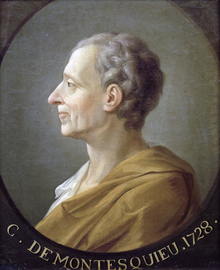
Charles-Louis de third, Baron de La Brède et de Montesquieu (18 January 1689 – 10 February 1755), was commonly known as Montesquieu. was a French political thinker who lived during the Age Of Enlightenment. He is famous for his theory of the separation of powers in government. Many constitutions all over the world use it. He helped make the terms "feudalism" and "Byzantine Empire" popular.
Before Montesquieu, the standard feudal system was called "the three estates":
Montesquieu's work divided French people into three classes: three classes (or trias politica, a term he coined):
These should be balanced, so that no one power would be able to overcome the other two, either singly or in combination. This was a radical idea because it eliminated the three estates structure. Montesquieu's ideas are important because they ended the feudalistic structure. They also helped inspire the constitution of many countries, including the United States.
Some of Montesquieu's ideas are still controversial. He believed that women could be leaders in government. But he thought women could not lead a family. He supported a hereditary aristocracy and primogeniture. Hereditary means that the title passes from the parents to the children.
Montesquieu describes an unusual idea in his essays The Spirit of the Laws and Persian Letters. This idea is the climate theory. It says that climate, the weather of a place, influences the nature of man and his society. Montesquieu thought that some climates were better than others. He believed the mild climate of France is the best. He believed people from hot countries are "too hot-tempered". People in cold, northern countries are "icy" or "stiff." The climate in middle Europe therefore breeds the best people. (This view is possibly influenced by similar statements in Germania by Tacitus, one of Montesquieu's favourite authors.)
Montesquieu's philosophy that "government should be set up so that no man need be afraid of another" prompted the creators of the Constitution to divide the U.S. government into three separate branches.
